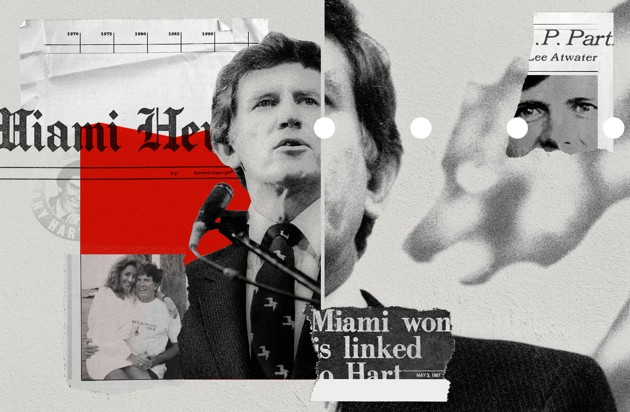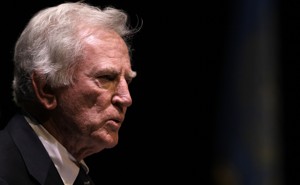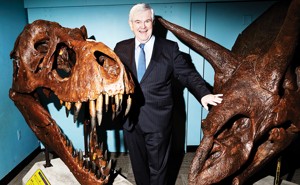Here is James Fallows' Atlantic article:
Was Gary Hart Set Up?
in the spring of 1990, after he had helped the first George Bush reach the presidency, the political consultant Lee Atwater learned that he was dying. Atwater, who had just turned 39 and was the head of the Republican National Committee, had suffered a seizure while at a political fund-raising breakfast and had been diagnosed with an inoperable brain tumor. In a year he was dead.
Atwater put some of that year to use making amends. Throughout his meteoric political rise he had been known for both his effectiveness and his brutality. In South Carolina, where he grew up, he helped defeat a congressional candidate who had openly discussed his teenage struggles with depression by telling reporters that the man had once been “hooked up to jumper cables.” As the campaign manager for then–Vice President George H. W. Bush in 1988, when he defeated Michael Dukakis in the general election, Atwater leveraged the issue of race—a specialty for him—by means of the infamous “Willie Horton” TV ad. The explicit message of the commercial was that, as governor of Massachusetts, Dukakis had been soft on crime by offering furloughs to convicted murderers; Horton ran away while on furlough and then committed new felonies, including rape. The implicit message was the menace posed by hulking, scowling black men—like the Willie Horton who was shown in the commercial.
In the last year of his life, Atwater publicly apologized for tactics like these. He told Tom Turnipseed, the object of his “jumper cables” attack, that he viewed the episode as “one of the low points” of his career. He apologized to Dukakis for the “naked cruelty” of the Willie Horton ad.
MORE STORIES
And in a private act of repentance that has remained private for nearly three decades, he told Raymond Strother that he was sorry for how he had torpedoed Gary Hart’s chances of becoming president.
Strother, 10 years older than Atwater, had been his Democratic competitor and counterpart, minus the gutter-fighting. During the early Reagan years, when Atwater worked in the White House, Strother joined the staff of the Democratic Party’s most promising and glamorous young figure, Senator Gary Hart of Colorado. Strother was Hart’s media consultant and frequent traveling companion during his run for the nomination in 1984, when he gave former Vice President Walter Mondale a scare. As the campaign for the 1988 nomination geared up, Strother planned to play a similar role.
This article appears in the November 2018 issue.
Subscribe now to support 161 years of independent journalism and save up to 78%. Starting at only $24.50. View more stories from the issue.

In early 1987, the Hart campaign had an air of likelihood if not inevitability that is difficult to imagine in retrospect. After Mondale’s landslide defeat by Ronald Reagan in 1984, Hart had become the heir apparent and best hope to lead the party back to the White House. The presumed Republican nominee was Bush, Reagan’s vice president, who was seen at the time, like many vice presidents before him, as a lackluster understudy. Since the FDR–Truman era, no party had won three straight presidential elections, which the Republicans would obviously have to do if Bush were to succeed Reagan.
Gary Hart had a nationwide organization and had made himself a recognized expert on military and defense policy. I first met him in those days, and wrote about him in Atlantic articles that led to my 1981 book, National Defense. (I’ve stayed in touch with him since then and have respected his work and his views.) Early polls are notoriously unreliable, but after the 1986 midterms, and then–New York Governor Mario Cuomo’s announcement that he would not run, many national surveys showed Hart with a lead in the Democratic field and also over Bush. Hart’s principal vulnerability was the press’s suggestion that something about him was hidden, excessively private, or “unknowable.” Among other things, this was a way of alluding to suspicions of extramarital affairs—a theme in most accounts of that campaign, including Matt Bai’s 2014 All the Truth Is Out. Still, as Bai wrote in his book, “Everyone agreed: it was Hart’s race to lose.”
Strother and Atwater had the mutually respectful camaraderie of highly skilled rivals. “Lee and I were friends,” Strother told me when I spoke with him by phone recently. “We’d meet after campaigns and have coffee, talk about why I did what I did and why he did what he did.” One of the campaigns they met to discuss afterward was that 1988 presidential race, which Atwater (with Bush) had of course ended up winning, and from which Hart had dropped out. But later, during what Atwater realized would be the final weeks of his life, Atwater phoned Strother to discuss one more detail of that campaign.
Atwater had the strength to talk for only five minutes. “It wasn’t a ‘conversation,’ ” Strother said when I spoke with him recently. “There weren’t any pleasantries. It was like he was working down a checklist, and he had something he had to tell me before he died.”
What he wanted to say, according to Strother, was that the episode that had triggered Hart’s withdrawal from the race, which became known as the Monkey Business affair, had been not bad luck but a trap. The sequence of events was confusing at the time and is widely misremembered now. But in brief:
In late March 1987, Hart spent a weekend on a Miami-based yacht called Monkey Business. Two young women joined the boat when it sailed to Bimini. While the boat was docked there, one of the women took a picture of Hart sitting on the pier, with the other, Donna Rice, in his lap. A month after this trip, in early May, the man who had originally invited Hart onto the boat brought the same two women to Washington. The Miami Herald had received a tip about the upcoming visit and was staking out the front of Hart’s house. (A famous profile of Hart by E. J. Dionne in The New York Times Magazine, in which Hart invited the press to “follow me around,” came out after this stakeout—not before, contrary to common belief.) A Herald reporter saw Rice and Hart going into the house through the front door and, not realizing that there was a back door, assumed—when he didn’t see her again—that she had spent the night.
Amid the resulting flap about Hart’s “character” and honesty, he quickly suspended his campaign (within a week), which effectively ended it. Several weeks later came the part of the episode now best remembered: the photo of Hart and Rice together in Bimini, on the cover of the National Enquirer.
Considering what American culture has swallowed as irrelevant or forgivable since then, it may be difficult to imagine that allegations of a consensual extramarital affair might really have caused an otherwise-favored presidential candidate to leave the race. Yet anyone who was following American politics at the time can tell you that this occurred. For anyone who wasn’t around, there is Bai’s book and an upcoming film based on it: The Front Runner, starring Hugh Jackman as Hart.
But was the plotline of Hart’s self-destruction too perfect? Too convenient? Might the nascent Bush campaign, with Atwater as its manager, have been looking for a way to help a potentially strong opponent leave the field?
“I thought there was something fishy about the whole thing from the very beginning,” Strother recalled. “Lee told me that he had set up the whole Monkey Business deal. ‘I did it!’ he told me. ‘I fixed Hart.’ After he called me that time, I thought, My God! It’s true!”
Strother’s conversation with Atwater happened in 1991. He mainly kept the news to himself. As the years went by, he discreetly mentioned the conversation to some journalists and other colleagues, but not to Gary Hart. “I probably should have told him at the time,” he said recently. “It was a judgment call, and I didn’t see the point in involving him in another controversy.”
Crucially, Strother realized, he had no proof, and probably never would. Atwater was dead. Although Hart did not run in later elections, he was busy and productive: He had earned a doctorate in politics at Oxford, had published many books, and had co-chaired the Hart-Rudman Commission, which memorably warned the incoming president in 2001, George W. Bush, to prepare for a terrorist attack on American soil. Why, Strother asked himself, should he rake up an issue that could never be resolved and might cause Hart more stress than surcease?
But late last year, Strother learned that the prostate cancer he had been treated for a dozen years ago had returned and spread, and that he might not have long to live. The cancer is now in remission, but after the diagnosis Strother began traveling to see people he had known and worked with, to say goodbye. One of his stops was Colorado, where he had a meal with Gary Hart.
Aware that this might be one of their final conversations, Hart asked Strother to think about the high points of the campaign, and its lows. Hart knew that Strother had been friends with Billy Broadhurst, the man who had taken Hart on the fateful Monkey Business cruise. According to Strother and others involved with the Hart campaign, Broadhurst was from that familiar political category, the campaign groupie and aspiring insider. Broadhurst kept trying to ingratiate himself with Hart, and kept being rebuffed. He was also a high-living, high-spending fixer and lobbyist with frequent money problems.
Strother talked with Hart this spring; Broadhurst had died about a year earlier. In retrospect, Hart asked, what did Strother make of the whole imbroglio?
“Ray said, ‘Why do you ask?’ ” Hart told me, when I called to talk with him about the episode. “And I said there are a whole list of ‘coincidences’ that had been on my mind for 30 years, and that could lead a reasonable person to think none of it happened by accident.
“Ray replied, ‘It’s because you were set up. I know you were set up.’
“I asked him how he could be so certain,” Hart told me. Strother then recounted his long-ago talk with Atwater, and Atwater’s claim that the whole Monkey Business weekend had occurred at his direction. According to Hart, that plan would have involved: contriving an invitation from Broadhurst for Hart to come on a boat ride, when Hart intended to be working on a speech. Ensuring that young women would be invited aboard. Arranging for the Broadhurst boat Hart thought he would be boarding, with some unmemorable name, to be unavailable—so that the group would have to switch to another boat, Monkey Business. Persuading Broadhurst to “forget” to check in with customs clearance at Bimini before closing time, so that the boat “unexpectedly” had to stay overnight there. And, according to Hart, organizing an opportunistic photo-grab.
“There were a lot of people on the dock, people getting off their boats and wandering up and down on the wharf,” Hart told me. “While I was waiting for Broadhurst and whatever he was working out with the customs people, I sat on this little piling on the pier.” Hart said that Donna Rice’s friend and companion on the boat, Lynn Armandt, was standing a short distance away. “Miss Armandt made a gesture to Miss Rice, and she immediately came over and sat on my lap. Miss Armandt took the picture. The whole thing took less than five seconds, with lots of other people around. It was clearly staged, but it was used after the fact to prove that some intimacy existed.”
What are we to make of Strother’s late-in-life revelation of Atwater’s deathbed confession? Hart’s reputation, deserved or not, certainly gave Atwater something to work with, if that’s what he did. (“It would be just like the perversity of history for someone to undertake an effort that might well have happened by itself,” Matt Bai told me when I spoke with him recently.) What would have induced Broadhurst to participate in an entrapment scheme? (When I asked Strother this question, he said, “Money.”) How exactly was the scheme supposed to work? Hart had been introduced to Donna Rice at least once before (briefly, at an event at the musician Don Henley’s house, in Colorado, that Hart attended with his wife), and he phoned her after the Monkey Business weekend. Both Rice and Hart denied any affair. A few people still living may know what happened that weekend, and why. (Rice, who now leads an internet-safety group called Enough Is Enough and goes by her married name, Donna Rice Hughes, did not respond to repeated requests for comment.) Most likely the rest of us never will.
Like other political calamities, the Hart downfall had consequences that will be debated for as long as the man’s name is remembered. History is full of unknowable “What if?” questions. What if whatever happened that weekend in Bimini had not happened? “I was going to be the next president,” Hart told me, clinically. He was, or might have been—and then he wasn’t.
If history had gone in a different direction in 1987, and Hart had become the 41st president rather than Bush, then Bill Clinton would not have had his chance in 1992, or perhaps ever. George W. Bush, who found his footing with a place on his father’s winning campaign, would probably never have emerged as a contender. When and whether Barack Obama and Donald Trump might ever have come onto the stage no one can say. “No first Bush if things had turned out differently,” Gary Hart told me. “Which means no second Bush—at least not when he arrived. Then no Iraq War. No Cheney. Who knows what else?”
In announcing the suspension of his campaign, Hart angrily said, “I believe I would have been a successful candidate. And I know I could have been a very good president, particularly for these times. But apparently now we’ll never know.”
We won’t.
This article appears in the November 2018 print edition with the headline “Was Gary Hart Set Up?”
We want to hear what you think about this article. Submit a letter to the editor or write to letters@theatlantic.com.
JAMES FALLOWS is a national correspondent for The Atlantic and has written for the magazine since the late 1970s. He has reported extensively from outside the United States and once worked as President Carter's chief speechwriter. He and his wife, Deborah Fallows, are the authors of the new book Our Towns: A 100,000-Mile Journey Into the Heart of America, which has been a New York Times best seller and is the basis of a forthcoming HBO documentary.




No comments:
Post a Comment